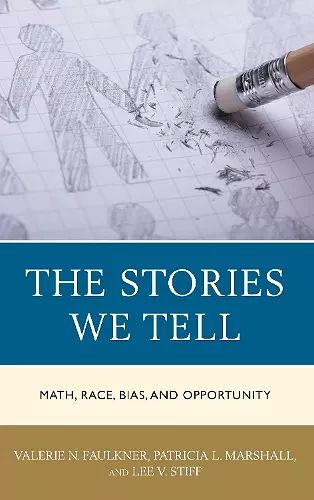The Stories We Tell
Math, Race, Bias, and Opportunity
Patricia L Marshall author Valerie N Faulkner author Lee V Stiff author
Format:Paperback
Publisher:Rowman & Littlefield
Published:31st Jul '19
Currently unavailable, and unfortunately no date known when it will be back

The Stories We Tell: Math, Race, Bias, & Opportunity positions educators as professional decision-makers whose every day choices are deeply consequential. After exploring topics ranging from the early identification of talent, the use of demographic characteristics to make academic decisions, and the problematic casting of a ‘gap’ in mathematical performance as about the students themselves, the book explores how professional decision making, and a more precise use of data, can impact mathematical performance outcomes. With gentle precision, the book analyzes the patterns of practice in place as educators sort children according to perceived needs. Through case studies, the authors reconfigure the mathematics achievement gap as being about opportunity provided or denied at both the classroom and systemic levels. The book has implications for school personnel as well as others curious about how opportunity impacts outcomes and how data is (or is not) used to make decisions about children. Educators who challenge themselves to engage with the possibility of bias, and then face the stories we tell ourselves about the race/talent development/student merit relationship, will have the opportunity to write a powerful and equitable story going forward.
Radical responses to oppression and dehumanization in mathematics education will require re-imagining new and different possibilities that do not produce new and different forms of oppression and dehumanization. This book takes up the challenge of re-imagining by telling a different story about so-called racial achievement gaps that position Black students as inferior. They recast the story in terms of opportunity and decision-making in the system that often fails Black students. -- Danny Bernard Martin, professor, education and mathematics, University of Illinois at Chicago
The Stories We Tell: Math, Race, Bias & Opportunity challenges the traditional dialogue about the achievement gap and radically reframes it. By problematizing data, ability grouping, and growth mindset, the authors provide new lenses by which we can examine these constructs with the goal of compelling us to think critically about our role in maintaining or changing the system. The authors offer a solid theoretical framing paired with practical recommendations for practice. This book is a must-read for anyone involved in making decisions related to the teaching and learning of mathematics. -- Marrielle Myers, Associate Professor of Elementary Mathematics Education, Kennesaw State University
The Stories We Tell: Math, Race, Bias, and Opportunity pushes readers to consider the many factors, decisions, and opportunities that contribute to differentials in achievement. The authors describe these as `gap makers’ which are fully examined as contributors to differences in achievement among learners. Readers are asked, “What if the students are not the problem to be fixed?” This book provides a framing for consideration towards the answer to this question by unpacking the many factors, decisions, and opportunities in a context that is accessible to educators across the grade bands. Educators will find that use of different contexts and vignettes provides connections that give meaning to why some students have an engaging mathematics experience built on high expectations with access to rigorous mathematics and, other students do not have access to this type of mathematics experiences. I will use this book with educators who influence policies as well as mathematics teachers and coaches to help examine the structural issues and the decisions that impact mathematics teaching and learning. -- Robert Q. Berry, Professor of Mathematics Education, University of Virginia; President, National Council of Teachers of Mathematics (2018-2020)
Finally, a book that sits the “gap problem” on the doorsteps of schools and districts and off the backs of children and parents. In this book, the authors use data to challenge our assumptions on achievement, rigor, and accountability as they explain how the decisions made by school administrations and politicians create, maintain, and exasperate the inequitable education of students. The authors provide new and realistic decisions we can all make to travel on their path to change. -- Dorothy Y. White, PhD, Associate Professor of Mathematics Education, University of Georgia
The school mathematics ecosystem represents an important opportunity structure in the field of education. This research captures the contours of this ecosystem with a focus on how it produces disparities. The book documents the challenges associated with improper data interpretation, bias, and cognitive dissonance. These biases influence decisions and support the creation of underdeveloped learning processes and harmful outcomes. The scholarship contributes to the literature on opportunity to learn in mathematics education. -- William F. Tate IV, Edward Mallinckrodt Distinguished University Professor in Arts & Sciences, Washington University in St. Louis
ISBN: 9781475841633
Dimensions: 231mm x 152mm x 9mm
Weight: 236g
160 pages